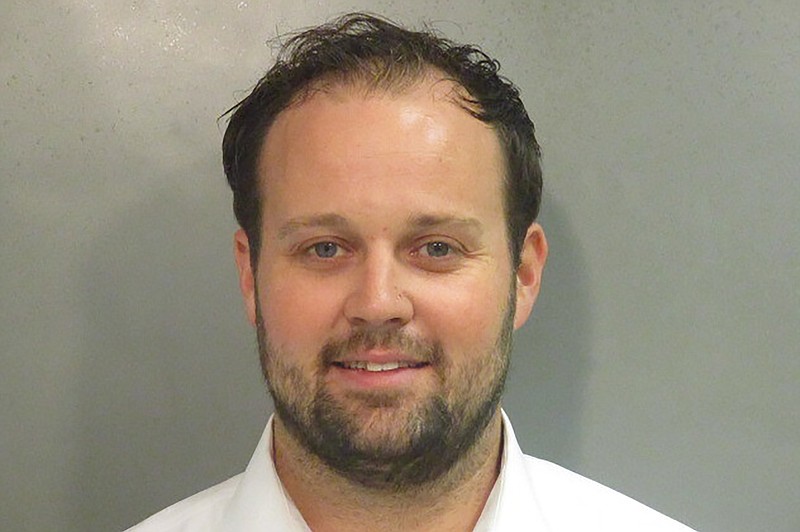FAYETTEVILLE -- A federal judge denied Josh Duggar's motion for acquittal or a new trial in his child pornography case Tuesday, meaning Duggar's sentencing will proceed this morning as scheduled.
U.S. District Judge Timothy L. Brooks said the evidence presented against Duggar at trial was sufficient to support his conviction. Brooks twice denied motions to dismiss the case based on insufficient evidence during trial.
Duggar, 34, of Springdale, was convicted Dec. 9 of possessing child pornography. Brooks is set to sentence him at 9:30 a.m. today in Fayetteville.
Prosecutors accused Duggar in early 2021 of using the internet to download and view child pornography, some of which depicts the sexual abuse of children younger than 12, according to court documents.
Prosecutors told jurors child pornography was repeatedly downloaded on the computer at Duggar's used car lot May 14, 15 and 16 of 2019.
Duggar's attorneys contended he didn't do it and suggested an unidentified, remote user may have downloaded the material.
Duggar's motion for a new trial or acquittal argued there was insufficient evidence for a jury to conclude that he actually viewed any child pornography.
"Mr. Duggar's argument lacks merit, as there is ample evidence he viewed the images of child pornography that had been downloaded to his business computer," Brooks wrote in his opinion Tuesday.
Brooks cited expert testimony from the trial that Duggar had set up a partition on the computer at his car dealership to defeat software that would tell his wife he was looking at pornography. Experts also testified there was evidence Duggar downloaded child pornography to that side of the computer and viewed it before deleting the files.
Brooks said the "coup de grace" is a timeline introduced by the government summarizing 50 or 60 exhibits of forensic evidence recovered from Duggar's HP desktop, iPhone 11, iPhone 8 and MacBook.
The evidence places Duggar at the car lot May 13, 2019, during the installation of the Linux partition and operating system and during May 14-16, 2019, at the times child pornography was downloaded to the HP desktop, according to Brooks.
Duggar's lawyers argued a new trial was required because the government did not disclose evidence that prosecutors talked with a possible defense witness named Caleb Williams. Williams was one of several individuals Duggar's attorney identified by name during opening statement as having had the motive and opportunity to commit the crimes.
They also argued the government failed to investigate others who may have had means, motive and opportunity.
"In the end, however, the defense's promise of an alternative perpetrator came to nothing, as the evidence at trial showed that Mr. Duggar -- and only Mr. Duggar -- was physically present at the car lot when child pornography was being downloaded," Brooks wrote.
Brooks said unsolicited email from Williams, who did not testify at the trial, to prosecutors was turned over to the defense, but the email contained no evidence that Williams was physically present at the car lot when child pornography was downloaded and the defense was unable to point the jury to any forensic evidence of remote access to the partition on the dealership computer.
Brooks said he issued an order before the trial allowing Duggar's defense team to raise the possibility of an alternative perpetrator, but cautioned them he would not permit the defense to present speculative testimony or make purely speculative arguments to the jury.
Expert testimony at trial was that someone was physically present at the car lot May 13 and installed the partition on the operating system by inserting a thumb drive into the HP desktop computer, Brooks noted.
Brooks also rejected an argument that a government expert should not have been allowed to testify about geolocation evidence related to pictures on Duggar's cellphone. The evidence showed when and where certain pictures were taken, putting Duggar at the car lot when the child pornography was downloaded.
Brooks said a defense expert had access to the same data prosecutors used, but never contradicted testimony about the various locations where the photographs were taken.
Duggar was charged in federal court with two counts involving receiving and possessing child pornography. The jury found him guilty on both counts after more than six hours of deliberation over two days.
He'll be sentenced only on the count of receiving child pornography because possession of child pornography is considered a lesser included offense under federal law.
Duggar faces up to 20 years in prison and fines up to $250,000. He's been held at the Washington County jail since being convicted.
Federal prosecutors are recommending Duggar be sentenced to 20 years in prison on his child pornography conviction, while Duggar's lawyers say he should receive no more than five.
Judgment of acquittal
A motion for judgment of acquittal is made when there is no legally sufficient evidentiary basis on which a reasonable jury could return a guilty verdict. In case the motion for judgment of acquittal is granted, the government has no right of appeal. An acquittal signifies that a prosecutor failed to prove his or her case beyond a reasonable doubt, not that a defendant is innocent.
Source: Staff report
